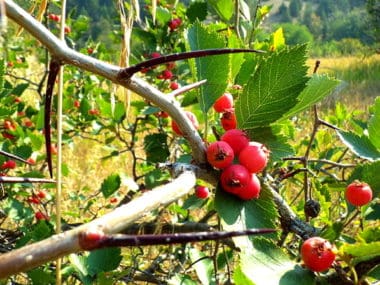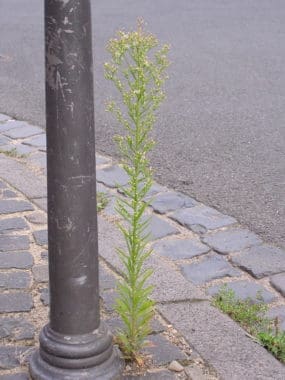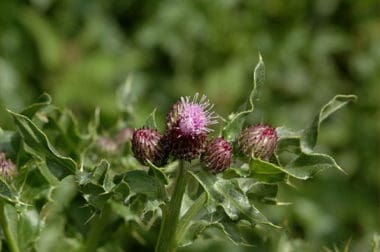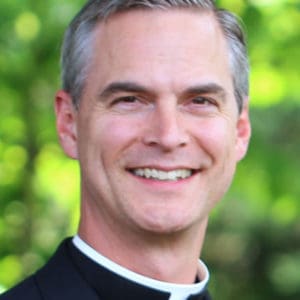Freeing My Heart
Dear Father John, I love God so much and want to be completely open to Him. How do I detach my heart from the things that bind it to this world?
 IN HIS PARABLE of the sower and the seed, Jesus pointed out that having good soil is not sufficient to assure fruitful growth. Some seed fell on excellent soil, but it shared that soil with thorn bushes. The thorn bushes grew with the good seed and choked it. Jesus draws the lesson from his analogy: “As for the seed that fell among thorns, they are the ones who have heard, but as they go along, they are choked by the anxieties and riches and pleasures of life, and they fail to produce mature fruit” (Luke 8:14).
IN HIS PARABLE of the sower and the seed, Jesus pointed out that having good soil is not sufficient to assure fruitful growth. Some seed fell on excellent soil, but it shared that soil with thorn bushes. The thorn bushes grew with the good seed and choked it. Jesus draws the lesson from his analogy: “As for the seed that fell among thorns, they are the ones who have heard, but as they go along, they are choked by the anxieties and riches and pleasures of life, and they fail to produce mature fruit” (Luke 8:14).
The anxieties and riches and pleasures of life aren’t evil in themselves. The problem comes when we allow them to divide our hearts, when we begin seeking them, instead of seeking God, or paying more attention to them than to God. Jesus is trying to warn us about what will happen to our spiritual life when we allow contradictory desires to co-exist in our heart, when we feed multiple desires, instead of feeding the one core desire and allowing that desire to bring all subordinate desires into harmony. He wants us to stay focused: “But seek first the kingdom (of God) and his righteousness, and all these things will be given you besides” (Matthew 6:33).
We need to nourish the Christ-centered desire at the core of our Christian heart, but we also need to protect that desire from thorns and parasites and other distractions that can starve it out.
The One Thing Needed
One of the Lord’s most memorable teaching moments arose in this context. He and his apostles had been invited to dine at the home of Martha of Bethany. Martha was busy keeping everyone happy. She was perturbed that her sister, Mary, wasn’t helping her. You probably remember what happened:
As they continued their journey he entered a village where a woman whose name was Martha welcomed him. She had a sister named Mary [who sat] beside the Lord at his feet listening to him speak. Martha, burdened with much serving, came to him and said, “Lord, do you not care that my sister has left me by myself to do the serving? Tell her to help me.” The Lord said to her in reply, “Martha, Martha, you are anxious and worried about many things. There is need of only one thing. Mary has chosen the better part and it will not be taken from her” (Luke 10:38–42).
Notice that Jesus didn’t reprimand Martha for being busy, or for doing a lot of things, but for being “anxious and worried about many things.” Martha was upset. Where did that come from? Clearly, she was not desiring only, and principally, the “one thing” needed—communion with God. In the hustle and bustle of entertaining, she had allowed her heart to be divided. She had become overly preoccupied with making a good impression by having everything come out just right. A tinge of vanity had temporarily upended the true priorities of her heart, leading her to overemphasize secondary things. She resented Mary for not sharing her desire to make the evening go perfectly according to plan. She lashed out at her sister in a typical family squabble. Whenever we allow self-centered desires to compete with, instead of being purified and ordered by, the one desire that we really need, we fall into the same trap.
Pulling Big Weeds
 The lesson is clear. We not only need to nourish our desire for God, we also need to keep the soil of our heart free from suffocating, contradictory desires. This takes two forms of spiritual discipline.
The lesson is clear. We not only need to nourish our desire for God, we also need to keep the soil of our heart free from suffocating, contradictory desires. This takes two forms of spiritual discipline.
First, we need to uproot the thorns that are already growing in our souls. These include obvious sinful habits, like losing our temper, procrastinating, gossiping, using pornography, lying, cheating, abusing alcohol or drugs, and all the other destructive behaviors that flow from the seven capital sins of gluttony, lust, anger, sloth, arrogance, envy, and greed.
These are behaviors that the fallen world tolerates, and even encourages. Popular culture glorifies them in music, film, and advertising. But they are poison for the heart. They destroy and enslave us and those we love. They are sins because they are evil, because they go directly against everything that will make us flourish as human beings created in God’s image.
Battles between Flesh and Spirit
St. Paul refers to these sins as the desires of our “flesh.” Flesh in this context doesn’t mean our bodies, our materiality, which is fundamentally good because it is created by God. Rather, it means our fallen nature, our wounded human nature that pulls us away from the path of life in God’s Spirit.
I say, then: live by the Spirit and you will certainly not gratify the desire of the flesh. For the flesh has desires against the Spirit, and the Spirit against the flesh…. Now the works of the flesh are obvious: immorality, impurity, licentiousness, idolatry, sorcery, hatreds, rivalry, jealousy, outbursts of fury, acts of selfishness, dissensions, factions, occasions of envy, drinking bouts, orgies, and the like. I warn you, as I warned you before, that those who do such things will not inherit the kingdom of God (Galatians 5:16–21).
Because tendencies toward these behaviors are rooted deep within us (often connected to emotional wounds that we are barely aware of) and continuously stimulated by influences all around us, uprooting the thorns of sinful habits can be a long and difficult process. Traditionally, this phase of spiritual growth is called the purgative, or purification, stage.
Pulling Little Weeds
 As the soil of our hearts is cleared of the big thorn bushes, we can focus more on watering and fertilizing the good desire for God… But even then, we have to keep a lookout for the return of new weeds—this is the second spiritual discipline that keeps our heart’s soil clean and rich. It involves sub-disciplines such as making room for silence in our daily lives, including some voluntary austerity in our lifestyle, keeping a healthy balance between work and rest, being more and more intentional as regards the kind of input we allow into our minds and imaginations—choosing, for example, types of entertainment and recreation that both delight and also edify. If we are careless in these little things, the weeds will surely come back, and the thorns will choke the precious core desire of the Christ-centered heart.
As the soil of our hearts is cleared of the big thorn bushes, we can focus more on watering and fertilizing the good desire for God… But even then, we have to keep a lookout for the return of new weeds—this is the second spiritual discipline that keeps our heart’s soil clean and rich. It involves sub-disciplines such as making room for silence in our daily lives, including some voluntary austerity in our lifestyle, keeping a healthy balance between work and rest, being more and more intentional as regards the kind of input we allow into our minds and imaginations—choosing, for example, types of entertainment and recreation that both delight and also edify. If we are careless in these little things, the weeds will surely come back, and the thorns will choke the precious core desire of the Christ-centered heart.
Editor’s Note: This is another excerpt from Father John Bartunek’s new book “Seeking First the Kingdom” filled with “practical examples and down-to-earth wisdom which will show you how to bring Christ into each facet of your life”. Click here to learn more about the book…or if you wish to get it for a friend or relative who doesn’t read on line.
+
Art for this post on freeing my heart: Crataegus chrsyocarpa, Matt Lavin, 3 September 2012; Icon of Christ at the Home of Martha and Mary, 21 June 2014 [exact provenance–as found on Wikimedia Commons–has been lost due to site error when updating the site]; Conyza canadensis am Straßenrand in Bonn-Beuel., Michael Becker, 11 August, 2005, all three CC-SA; Flowers of creeping thistle (Cirsium arvense), Verulamium Park, St Albans, Hertfordshire, Gary Houston, own work, 11 June 2005, CC-Universal Public Domain; all Wikimedia Commons.




